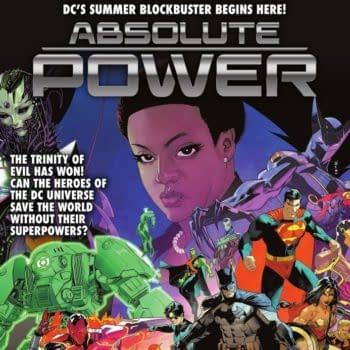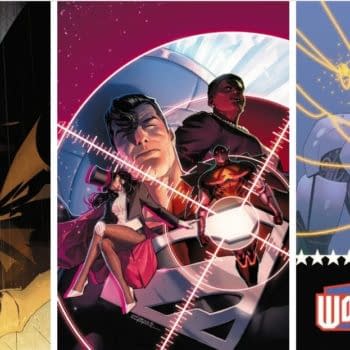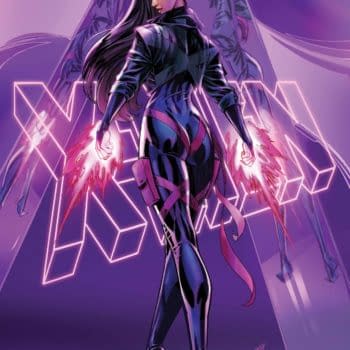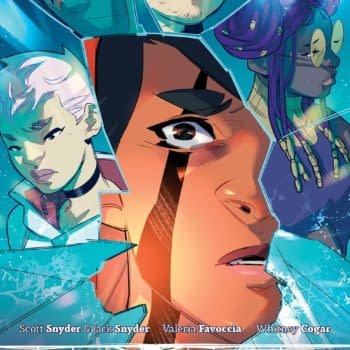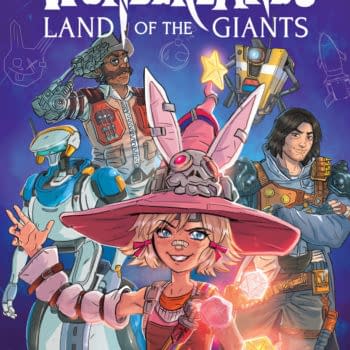Posted in: Comics, Recent Updates | Tagged: avatar press, Comics, entertainment, God is Dead: Alpha, God is Dead: Book of Act, God is Dead: Omega, mike costa
Mike Costa's Master Plan Detective Story For God Is Dead: Alpha With Alan Moore And Simon Spurrier
The new arc of God is Dead is entitled "Book of Acts" and is set the spread the net even wider on what we think of when we examine our human history of religion and veneration and the ways in which our psychology ties both to astonishing levels of strife and destruction. In the first arc of the series, now collected in trade edition, we see pantheon after pantheon of gods from every cultural mythology returning to earth in a new incarnation, seemingly caused by the death of a higher supreme being who previously kept this mayhem in check.
Set loose upon the world, they vie for followers and global domination with divine powers running rampant to reach those goals and destroy their adversaries. One of the most engaging things about this series is the realistic touches in human behavior and reaction that speaks to life in the 21st century so clearly while using equal realism to depict how life would actually be walking among terrifyingly powerful god-like beings with their own agendas.
The first two issues of the new arc are unique in that they bring together several ten-page comics by all-star creators painting their own picture of myth and apocalypse within the God is Dead universe, folded into the main storyline by series writer Mike Costa, entitled "Alpha" and "Omega", with art by Facundo Percio, Gabriel Andrade, and Rafael Ortiz, with covers by Jacen Burrows. Bleeding Cool announced that Alan Moore would actually be writing one of the stories for "Alpha", featuring the return of his own personal god Glycon (read about that here), but he'll be joined in "Alpha" by Simon Spurrier and Mike Costa on writing duties.
Bleeding Cool talks to Mike Costa today about the expanding world of God is Dead, the ideas that are becoming prevalent in the series about how we create and limit our own deities, and where all the building tension in "Book of Acts" is heading. And he also reveals why "Alpha" and "Omega" are essentially a detective story that many fans might not be expecting.
Hannah Means-Shannon: What prompted the desire to create the two mega-issues with big reveals and side-stories? Is it that the story is getting so big and with such a massive spread of implications that it almost needs the breathing room of two novellas?
Mike Costa: Well, the story definitely is getting huge, and there are a lot of different characters with a lot of different agendas, and I also want to try to develop as many of the pantheons as I can, since there are so many great potential characters out there. I try to do my best streamlining everything for the main book, and that's why we have the back-up stories and the main story subtly (or sometimes not-so-subtly) tends to shift focus every six issues or so. But even with all the flexibility in the structure of the book, there was one major story I have been having trouble placing. It was too big and important to be a back-up, but it didn't really fit on the main story either. I was slamming my head against the wall, trying to figure out how to make everything work without losing too much focus in the book.
Credit where credit is due, it was actually William [Christensen] who suggested we make it a big two-parter, and really make a party of it by inviting tons of other high-profile creators – including Alan Moore! – to contribute other stores to the God Is Dead world. One of the great things about working for Avatar is that William only publishes books he really believes in, which means, by the symmetric property of mathematics, that he really believes in the books he publishes. So he's always trying to make the big ideas in the book even bigger, and to think up publishing events to bring more eyes to the book.
HMS: Which pantheon is your favorite to research and write about? Any favorites in terms of dialogue?
MC: For "Book of Acts" I had to do a lot of research into both Indian and early Arabian mythology, which was really interesting. Those are pantheons who haven't gotten a whole lot of attention in the main book so far, but the story I was telling is deeply rooted in both. The Greeks are a lot of fun because there's just so many of them. They have Gods – or at least Personifications – for the most esoteric things.
But, honestly I think the most fun I'm having is writing the Gods that show up in the new back-up stories that start in issue 16. Those stories are titled – rather cheekily, I admit – "American Gods." So far in the series, we only mentioned the Americas in passing, because most of the continent was an irradiated wasteland after the events of the first six issues. But after Jesus healed the world, the radiation dissipated and everyone in the Americas came back to life as well. We're finally going to get to see what's been going on over there, and writing about the Native American pantheons… that really has been the most fun, if only because they're just so different from the Eurasian mythologies.
HMS: Without giving too much away, there's a lesser kind of character in 1 and 2 who plays a surprising role. Why choose a bit of a scoundrel and underdog to tell such an important story? What does that do for the story as a whole?
MC: The two-part story in "Book of Acts" is a different kind of story than we've done in God is Dead before. It's basically a detective story. We're finally solving a mystery that's been set up since the first issue of the series, though it's so infrequently mentioned and so subtly touched upon that I think a lot of readers might not realize there even IS a mystery to solve, which is part of the fun.
But anyway, a detective story needs a POV character who, you know, acts as a detective. And none of the characters we've already established really fit that bill. Plus, most of them are already busy in the main story anyway. So we needed to find a new character to follow, and I found one who perfectly fit the bill. In Arabian mythology, Ifrits are spirits of fire. They're sometimes seen as evil, but mostly they're simply amoral. As spirits of fire they are fickle, but they also represent curiosity and knowledge. And they are also often portrayed as being born from the blood of a murder victim. There are a lot of other ways that Ifrit mythology ties into the story we tell, but revealing them would give too much away. Just trust me when I say, an Ifrit is really the perfect character to hang this story on, and I think readers are going to be very surprised to see where we're going with him.
God is Dead: Book of Acts starts off with God is Dead: Alpha, arriving from Avatar Press on August 13th, with item code JUN140844.














